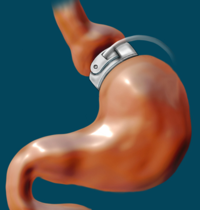
Photo from wikipedia
BackgroundLaparoscopic adjustable gastric banding (LAGB) placements have progressively decreased in recent years. This is related to poor long-term weight loss outcomes and necessity for revision or removal of these bands.… Click to show full abstract
BackgroundLaparoscopic adjustable gastric banding (LAGB) placements have progressively decreased in recent years. This is related to poor long-term weight loss outcomes and necessity for revision or removal of these bands. Long-term outcome results following LAGB are limited. The aim of our study was to determine the long-term outcome after LAGB at our institution.ObjectivesThe aim of our study was to determine the long-term outcome after LAGB at our institution.SettingThe setting of this is Academic Center, Israel.MethodsPatients who underwent LAGB between 1999 and 2004 were reviewed. Patient comorbidities and weight loss parameters were collected preoperatively and at defined postoperative periods. Improvement in weight loss was defined as percent excess weight lost, and improvement in comorbidities was defined based on standardized reporting definitions.ResultsIn total, 74 (80%) patients who underwent LAGB met inclusion criteria. The mean age at LAGB placement was 50.5 ± 9.6 years, and the mean body mass index (BMI) was 45.5 ± 4.8 kg/m2. Preoperative comorbidities were diabetes mellitus (13.5%), hypertension (32%), hyperlipidemia (12.1%), obstructive sleep apnea (5.4%), joints disease (10.8%), mood disorders (5.4%), and gastro-esophageal reflux disease (GERD) symptoms (8.1%). The mean follow-up was 162.96 ± 13.9 months; 44 patients (59.4%) had their band removed, and 22 (30%) had another bariatric surgery. The follow-up BMI was 35.7 ± 6.9 (p < 0.001), and the % total weight loss was 21.0 ± 0.13. There was no improvement in any of the comorbidities. GERD symptoms worsened at long-term follow-up (p < 0.001). Undergoing another bariatric procedure was associated with a higher weight loss (OR 12.8; CI 95% 1.62–23.9; p = 0.02).ConclusionLAGB required removal in the majority of our patients and showed poor resolution of comorbidities with worsening of GERD-related symptoms. Patients who go on to have another bariatric procedure have more durable weight loss outcomes.
Journal Title: Obesity Surgery
Year Published: 2017
Link to full text (if available)
Share on Social Media: Sign Up to like & get
recommendations!